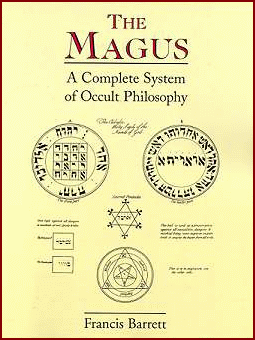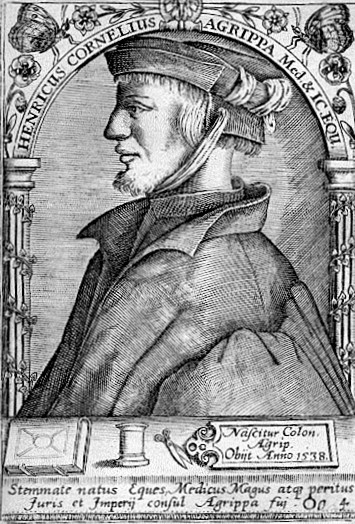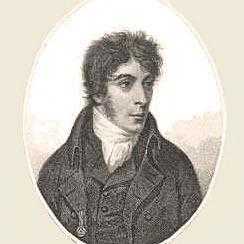The Magus by Francis Barrett
(Weiser Books, 2000)

Henricus Cornelius Agrippa was born in Cologne in 1486 and had read
Speculum by the great alchemist and fellow native of Cologne, Albertus Magnus. Some time after this, he traveled about and always seemed to be well connected. This has led his biographers such as Nauert and Zambelli to speculate that Agrippa belonged to one or more secret societies. Agrippa was a pupil of the abbot Trithemius in Germany about 1509 and 10 under whom he studied alchemy and philosophy. He showed great promise although in what way is arguable. Some say he possessed very high intellect while others say he was no more than average for his day but had a great ability to convince others of his intellect and powers. Whatever the truth is, there is no doubt that Agrippa had many convinced that he could transmute base metals into gold simply on command, raise and command all the “spirits of the air and demons of the earth,” and raise the dead. He also appears to have studied Arabic magic although no one is sure when or under whom. Much of his philosophy seems to be drawn from the Sufi or tasawwuf (lit. “to wear wool”) as they call themselves, and his student, Wierus, was also quite versed in Arabic magic and mystical philosophy.

Agrippa did not earn his reputation by being quiet and unassuming. Like his contemporary, Paracelsus, he was outspoken to the point of bombast (in fact, the very word “bombast” was derived from Paracelsus’ true name, Theophrastus Bombastus). A staunch Catholic, Agrippa favored the reformist Martin Luther while opposing the Dominicans whom he considered full of vice and poison probably due to their carrying out of the Inquisition.
Henry VIII, always in need of money and, like many sovereigns before him, was not above extorting it from his loyal subjects, invited Agrippa to come live in England under his protection. Obviously, Henry had heard about the great transmuting powers of Agrippa and was hoping to have an inexhaustible supply of gold. In England by 1510, Agrippa encountered the humanist movement of Sir Thomas More, John Colet and Erasmus. He may have been in England only a short while but we know that he and Colet were studying the biblical epistles together.
By 1511, Agrippa was in Italy—the center of the humanist movement and where Erasmus had been for the three years prior. Agrippa absorbed the occult philosophy freely taught in Italy by some of Europe’s finest scholars. Cabala was huge in Italy at this time and Agrippa made the acquaintance of Agostino Ricci, a converso who was interested in the Catholic Reform movement and how cabala could play a significant role in bringing it about along with his colleague, Cardinal Egidius of Viterbo.
Agrippa enjoyed great success with sovereigns everywhere he went. Emperor Maximilian made him his secretary and bestowed the title of Chevalier on him. He was even given command of a regiment although this was an honorary position. For a man such as Agrippa, the thought certainly counted.
Back in France at the University of Dole, Agrippa taught Hebrew. Again, we encounter another supposed Christian magician who really appears to be a Jew. Hebrew was a dead language at this time. Few European Jews spoke anything but European languages and Middle Eastern Jews spoke only Aramaic and had since well before the times that Christ supposedly walked there. Hebrew was known only to Jewish scholars and rabbis and yet here is Agrippa in Europe teaching Hebrew. However, Agrippa’s post at Dole would not last long. He came to loggerheads with the Franciscans over a theological point and was forced to flee to London where he continued to teach Hebrew as well as practice astrology.
He later went to Pavia where he lectured on Hermes Trismegistus, the Emerald Tablet and the Corpus Hermeticum. However, his alchemical learning and typical irascibility fell under suspicion of the clergy and Agrippa decided to accept the title of Advocate-General of Metz. Again, Agrippa found himself opposing the clergy on everything from the fidelity of St. Anne to witchcraft. The Dominican Inquisitor, Nicholas Savini, had ordered the arrest of a peasant girl whose mother had been accused of witchcraft. Savini stated that if one was a witch the other was likely a witch as well. Agrippa again spoke up and stated that heredity was not just cause to arrest the girl. She was taken away to be tortured, which Agrippa, to his credit tried to prevent but failed. However, at her trial, he stood by her and won her acquittal. In fact, he succeeded too well for his own good. The girl’s accusers were fined! In the bitterness of their humiliating defeat, they naturally accused Agrippa of being a magician, something actually quite true and, in 1520, he was forced to flee from Metz.
Agrippa went to Cologne but the heat was on against witchcraft, sorcery and the like and getting so hot that he was unable to stay. He became an itinerant fortune-teller and healer after this. He went to Geneva, Chambrai, Freibourg, Lyons and finally ended up in Holland under the protection of the governor, Margaret of Austria. Even then his passport was torn up by the Earl of Vendôme who contemptuously called him “a conjuror.”
In 1528, while in Antwerp, Agrippa publicly claimed to oppose Henry VIII due to his much-publicized divorce from the Spanish royal lady, Catherine of Aragon, in favor of the English commoner, Anne Boleyn (although Henry had first taken up with Anne’s sister, Mary). Agrippa was probably sought out to give weight to Catherine because Henry had a Franciscan friar named Francesco Giorgi (1466-1540) on his side. Despite his Franciscan status, Giorgi was another Neo-Platonist cabalist who wrote
De Harmonia Mundi (1525) and
Problemata (1536). Like Agrippa, he was another Hebrew scholar and we can be reasonably certain that Agrippa was sought out for the same reason. In fact, the Jewish law on divorce was appealed to in this case.
Eventually, Wierus, a physician at Cleves, became a disciple of Agrippa’s and stayed with him for several years. Thanks to his level-headedness, many of the fantastic stories about his teacher can be safely laid to rest. Agrippa, for example, was said to have a familiar spirit in the form of a black dog which accompanied him everywhere and even ate at his table. Agrippa always seemed to know what was going on everywhere despite the fact that he would shut himself away in his magical laboratory for a week or more without once being seen. People assumed the dog roamed about and kept Agrippa informed of current events but may have actually been due to his connections into secret societies. Paulus Jovius even relates a story that, upon his deathbed, Agrippa removed the dog’s collar with its necromantic inscription and told it, “Begone, wretched animal, which has been the cause of my entire destruction.” The animal then promptly ran to the River Saône and drowned itself. Wierus assures us that nothing of the sort was true. Agrippa did indeed have a black dog that he let eat at his table but it was simply a pet that he was very fond of. Wierus himself had taken the dog for many a walk pronouncing him a perfectly innocent and affectionate animal.
Other feats of magic attributed to Agrippa, however, have not been accounted for. Whether they are exaggerations or delusions or a combination of both is not known. There is the possibility that Agrippa staged them with secret help and so we are once again speculating about his connection to secret societies. For example, the Earl of Surrey, Erasmus and others encountered Agrippa at the court of the Elector of Saxony. Erasmus bade him to materialize Tully giving his oration for Roscius. Agrippa commanded Tully to appear and supposedly he did and gave his oration “with such astonishing animation, so fervent an exaltation of spirit, and such soul-stirring gestures, that all the persons present were ready, like the Romans of old, to pronounce his client innocent of every charge that had been brought against him.”
The Earl of Surrey was also allowed to see, at his request, his mistress in a magic glass of Agrippa’s as she wept piteously for her love in his absence. Similarly, Agrippa had shown Thomas Cromwell a hunting party of Henry VIII’s in the Windsor forest with his magic glass. He showed Charles V images of Solomon, David, Gideon and nine others in his glass in historically accurate detail. He also had Thomas More dream the entire Fall of Troy. He also supposedly had a group of demons reanimate a meddling man they had killed in Agrippa’s house during his absence and walk the man about town so that people would think he was alive and then have the man drop dead of an apparent disease thereby getting Agrippa out of a scandal but apparently the man’s strangulation marks were too obvious to go unnoticed. From this episode, we can chalk up Agrippa as the first to pull “A Weekend at Bernie’s.”
In 1532, Agrippa completed his large three-volume work,
Occult Philosophy, which was published in Antwerp much to the chagrin of the Inquisition. This was his second book to be published. In 1526, his
De Vanitate Scientiarum had been published in France. While the first book had stated that all sciences, including the occult sciences, were empty and that there was nothing new under the sun, in his new book, Agrippa talked of a “key” to magical knowledge that would open all doors. Under the title,
De Occulta Philosophia, Agrippa’s work is valuable as it places the magic of Ficino side-by-side with the Qabala of Pico and the compendium played a large role in the spread of Neoplatonism during the Renaissance. The philosophy espoused in Agrippa’s three volumes contained what certainly appears to be, as stated, Sufi philosophy as well as an influence from Reuchlin and his brand of Christianized Cabbala—something “powerful” that could reinforce the Lutheran evangelical reform popular in that day without overshadowing the humanism that existed before the Reformation.
Occult Philosophy was not a new work. Agrippa had written an early draft back in Germany and had dedicated it to Trithemius. This draft still exists. However, he ran into trouble with Erasmus over the work. Even though the two men had been fairly close and appeared to respect one another, Erasmus began to show a definite anti-Semitic streak. Erasmus had originally encouraged Reuchlin in his studies of the qabbala but now was against any “Judaising” of Christian philosophy. Specifically, Erasmus did not want occult philosophy in the form of ceremonial magic applied to Christian ceremonies as a means of strengthening the Christian religion with a more powerful philosophy. This was the very idea that Agrippa championed in the third book of Occult Philosophy. The attitude of Erasmus would demonstrate that magic in Europe was viewed by gentiles as being primarily Jewish. Apparently the idea of Jewish philosophy being employed as the backbone of Christian reform worried Erasmus and so he and Agrippa found themselves at loggerheads.
Some years later, a fourth book appeared that was attributed to Agrippa and included in
Occult Philosophy. It was a grimoire of magic spells purported to be the key Agrippa had spoken of. Wierus and others ridiculed it. Agrippa himself had nothing to say on the matter as he had died in Grenoble some years before in 1535 in the house of a wealthy patron. All four books were published in English a century later in Britain.
The reason for the biography of Cornelius Agrippa is because Barrett’s book, published in 1801, was essentially taken from the four books of Agrippa’s
Occult Philosophy and also from the
Heptameron of Peter of Abano translated in 1655 by Robert Turner. Barrett, whose birth and death are not precisely known, was considered quite an eccentric in his day who taught the magical arts to students in his apartment.

Francis Barrett.
The book covers natural magic (talismans, amulets, charms, stones, etc.), alchemy, astrology, seals, elements, numerology, magnetism, cabbala, exorcism, skrying (crystal ball gazing) and conjurations of spirits. There are also a number of biographies including one of Agrippa. So the tradition of Agrippa is carried on here to great length.
The Magus was not well known or received in Barrett’s day but became quite popular when magician Eliphas Levi (Alphonse Louis Constant, 1810-1875, a non-Jewish Frenchmen who Judaised his name) began to use it. From there, the Hermetic Order of the Golden Dawn used as a basis for their ceremonial magic. The book also contains some strange artwork to be used in the various rituals.

The book is available in a number of editions. I had it back in the 80s with a greenish cover but that disappeared so I bought a new one in the 90s with the cover shown above. I have seen at least three other editions all with different covers.